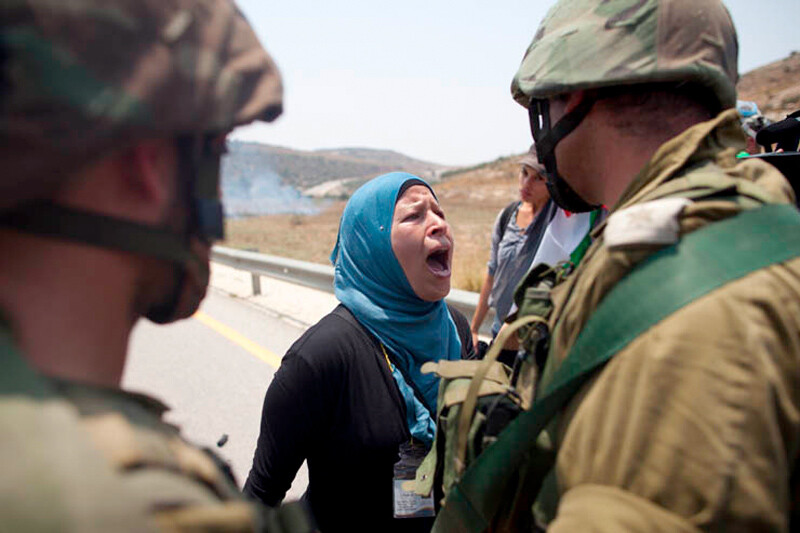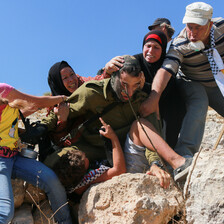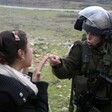The Electronic Intifada Nabi Saleh 18 July 2011

Nariman Tamimi is a regular presence at the West Bank village of Nabi Saleh’s weekly demonstrations against the occupation.
ActiveStillsThe first time I went to Nabi Saleh someone pointed out Nariman Tamimi to me. I had already figured out she was the imprisoned grassroots activist Bassem Tamimi’s wife, and as we politely exchanged greetings I blurted out, “Your face is so familiar, like I know I’ve seen you before.”
“Probably at one of the protests in Ramallah or Qalandiya, I’m always demonstating,” came the nonchalant reply.
Along with his cousin Naji Tamimi, also in prison, Bassem has been a leader of the Nabi Saleh Popular Struggle Committee and before his arrest was at the forefront of the weekly demonstrations confronting the Israeli army. The protests were kick-started a year and a half ago after settlers from the adjacent settlement of Halamish further expropriated the village’s main water supply, the spring of al-Kaws.
Bassem has been jailed in Ofer prison in the occupied West Bank since his arrest on 6 March on the basis of “incitement” and “organizing unlawful protests,” a claim which he defiantly rejected. The army’s evidence against Tamimi is a confession made by two village children who were abducted from their homes in the middle of the night, subjected to torture and denied legal counsel. The European Union representative to the UN Human Rights Council has expressed concern over the arrest of Tamimi and other human rights defenders (“European Union Expresses Concern Over Persecution of Bassem Tamimi,” Popular Struggle Coordination Committee, 16 June 2011).
Tamimi was arrested eleven times prior without ever being convicted of an offense. With the start of the weekly protests in Nabi Saleh his wife Nariman and their children have been targeted by the army, with Nariman spending time behind bars and the two oldest sons suffering injuries from tear gas canisters.
There’s a running joke in the village that Nariman unofficially adopts female activists as her daughters. Now as we sit at her kitchen table, chatting like old friends, it’s clear that she must not be characterized as just Bassem’s wife. She’s a mother of four studying international law and she’s been instrumental in documenting every Friday protest.
At one point during the interview, Nariman looks straight at me with her clear blue eyes and declares, “I, Nariman Tamimi, was injured, arrested, had my son injured, a demolition order placed on my house and my husband arrested. But despite all of that I believe that having inculcated peace in my children, the kind that stems from the inside, it will give away to fruitful results. I can’t shout that I’m for peace while holding up a gun.”
Linah Alsaafin: What is your role during the weekly protests?
Nariman Tamimi: I initially joined the protests as a medic, since I knew basic first aid and took courses with the Medical Relief agency. My role is to film and document the violations committed by the Israeli army against the protesters and the villagers. I also deliver first aid to those who need it. I work with B’Tselem, the Israeli human rights organization.
LA: How hard do you find it not to join in the protests while documenting?
NT: It’s difficult to film and at the same time join the protest — especially because of my belief that these protests are legitimate and peaceful, and we are asking for our rights. But of course I’m aware that I could be endangering myself if I do participate, and that the army will prevent me from filming. They already try to stop me from filming even when I don’t participate. Every journalist or cameraperson or any documentarian must be objective and not get caught up with the protesters chanting, but for me this is hard to do and I had already warned B’Tselem about this.
LA: As we know, the village is not united on the protests because of Israel’s repressive response affecting the entire village. What do you think of this and how has that affected your relationship with the opposition?
NT: Everywhere you go you’ll always find the positives and the negatives, the supporters and the opposition. But I think that if you find yourself on the positive side then the negative factors will only serve as more encouragement for you to continue on, because the bullet that doesn’t kill you only makes you stronger.
LA: How have your children coped with the arrest of their father?
NT: My kids went through a more traumatic experience, and that was my detainment. The arrest of a father is unfortunately a widespread phenomenon in Palestinian society, but for children to have their own mother arrested is unquestionably harder to cope with than the arrest of a father. The mother can act the role of two parents and be there for her children in the way a father can’t. Of course, Bassem’s arrest distressed them, but my children are strong and know better than to let it affect them negatively. The effects of the future on them all comes down to how we raise our children. We instill in them love of their country, the sacrifices needed to secure our rights, et cetera.
LA: What is your opinion of the term “nonviolent resistance?”
NT: What is nonviolent resistance? Is it when a soldier shoots at me and I thank him? I think that in order to protest nonviolently one must be convinced from within, where there isn’t any malice or hatred and the hearts communicate with each other, so this internal goodness and peacefulness must broaden out externally. But nonviolent resistance doesn’t mean that a soldier can enter my house, violate my woman and I remain passive. On the contrary, I’ll respond back. Nonviolent resistance is mostly verbal; we respond back with words, but if a stone was the response or comeback then that doesn’t mean it is a weapon. It is more of a message than a weapon.
After being subjected to enormous pressure from the violent tactics of the army for hours and having the soldiers firing tear gas non-stop and then barging into houses, throwing rocks at the soldiers is more of a retaliatory symbolic message.
Our war from the onset is against the media and that is what was missing from the previous protests in our history. The Israelis made did a report about Nabi Saleh on their Channel 2, and they named it “The Deadly Play,” because according to them, when a child stands in front of the army jeep, the cold-hearted villagers make sure to document that without caring about the safety of the child.
LA: Naji Tamimi has already been tried and convicted [and sentenced to a year in prison and a 10,000 shekel fine]. Bassem’s trial is once again postponed to 27 August. The evidence against your husband is the coerced confessions extracted from two youths from the village. How hopeful are you about his case in light of the European Union’s concern over his persecution and arrest?
NT: [Since] the EU paid lip service to Bassem as a defender of human rights, and the fact that Bassem didn’t do anything wrong, then the way I see it, the EU must work to secure his release. That’s the way I understand it. Naji — my maternal uncle — agreed to the deal put forward by the court, the prosecutor and the lawyer because of his refusal to recognize the legitimacy of the court itself. If he gets jailed for two and a half years, what will that be for?
The deal at least gave him a year and a fine; it will be a lighter load on him even if it meant confessing to the charges brought against him. But the court, if you confess or if you don’t confess, has the power to sentence you in any way its likes. Bassem, on the other hand, went in the complete opposite direction. He didn’t agree to sign the deal even though it means that he’ll get a prison sentence of two and a half years, based on a confession from a 14-year-old boy whom the Israelis beat up — even the judge went crazy when he saw the [recording of the] interrogation.
If Bassem does get that sentence because of the coerced confession from a youth, then I believe that with a deal his presence with us here is more advantageous than his time in the Israeli prisons because of his contacts and the movements he works with. Israel believed that in arresting Bassem and Naji, they had finally caught the organizers of the protest. What the Israelis don’t realize is that there is no central organizer here in Nabi Saleh — even a child can decide what to do and what not to do, and so the Israelis believed that in arresting the “two leaders” they can effectively kill off the protests, but that hasn’t been the case at all. We have more people joining in, the protests continue to take place and develop week after week, and our momentum hasn’t been stopped at all.
LA: Tell me a little about your arrests.
NT: The protests started in December 2009. The first week I didn’t participate. The second week I got injured. The third week I was arrested for a day after the soldiers viciously beat up me and the other villagers. They cursed us and used appalling words. The fourth week I was arrested for the second time and I was held for ten days, but I honestly feel that that my detention did not affect me detrimentally at all.
My spirits were kept high and that particular experience only reinforced me to carry on because Israel tried to silence our words of truth. B’Tselem had observed that I was in vantage points where there was a lack of camera presence and approached me after I was released from my second arrest as a sort of protection for my suspended sentence of three years. However that in no way grants me immunity from the unpredictable actions of the Israeli soldiers, as they took my [card showing that I work for B’Tselem], beat me up again and threw it away. There is no such thing as immunity in Israeli discourse.
LA: Have the protests been centered on primarily raising awareness, and do you see this kind of resistance spreading across the West Bank?
NT: Definitely, the protests have caused a lot of awareness and the evidence is that we have Palestinian youth coming from different districts in the West Bank who are committed to going to Nabi Saleh every week. Activists from Israel and the international community are part of the popular resistance that is key to forming the awareness that leads others to denounce Israel as an occupying force and a military state, which is why our war is against the media.
It is a good sign to see more and more people getting convinced and exposing Israel’s crimes and atrocities in a way in which the world can understand them. This current resistance is inclusive of all the members of society, much like the first intifada, which was a true popular uprising, and I do believe that the current protests will spread because of their result of undermining the state of Israel and attracting international responses. The more that increases, the better it is for us.
LA: Do you believe that being so heavily involved in the protests, you have changed as a person or have had your line of thinking altered?
NT: At the start of the protests, I used to see Israel solely embodied as an armed soldier, the army, the interrogator, the female soldier who killed Imm Nizar [editor’s note: Bassem’s sister and the mother of Nizar Tamimi who was arrested in 1993 and is currently serving a life sentence. She was killed after a female soldier accosted her and hit her on the head when she came to Nizar’s court hearing in 1993].
As the popular resistance continued week after week, I began to realize the humanity in the Israeli activists, like [Israeli activist] Jonathan [Pollack], for example. I started to think more humanely about Israel; after all, didn’t Jesus Christ say “love thy enemy?”
That is why I am convinced that peace in sync with harmony must be internalized as well as being a vital part of your internal being. I used to feel incredulous whenever I heard the philosophical words of loving your enemy because I didn’t know what that meant, but I do now.
This love that comes from deep inside your soul is effervescent and has the energy to spread and affect the enemy in a favorable way. I’m sure psychology can explain this type of communication. I’m at peace with myself and I’m happy that my children, despite being put through such acts of violence, are able to grasp and accept the idea of loving a non-Zionist, non-occupying Israel.
Linah Alsaafin is a recent graduate of Birzeit University in the West Bank. She was born in Cardiff, Wales and was raised in England, the United States and Palestine. Her website is http://lifeonbirzeitcampus.blogspot.com/.




